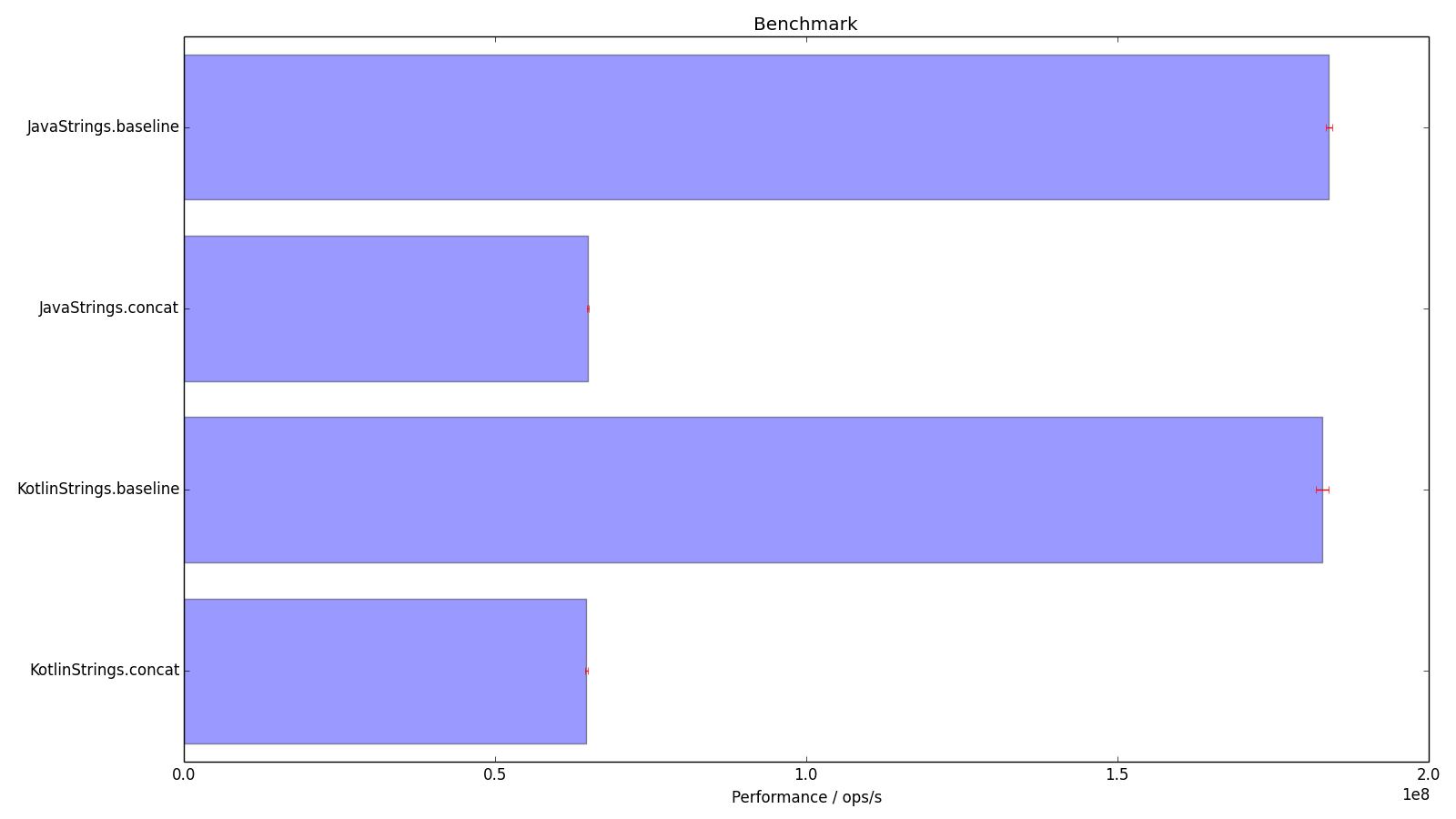The Cost of Kotlin Language Features - Preliminary Results Part 2 - Strings
08 Oct 2017This is Part 2 in a series examining The Cost of Kotlin Language Features in preparation for my presentation at KotlinConf in November. The series consists of
- Lessons Learned Writing Java and Kotlin Microbenchmarks
- Part 1 - Baselines
- Part 2 - Strings
- Part 3 - Invocation
- Part 4 - Nullable Primitives
- Part 5 - Properties
I’m publishing these results ahead of KotlinConf to give an opportunity for peer-review, so please do give me your feedback about the content, experimental method, code and conclusions. If you’re reading this before November 2017 it isn’t too late to save me from making a fool of myself in person, rather than just on the Internet.
In this post I look at String interpolation, the language feature that allows you to embed Kotlin expressions inside strings.
Let’s build the string Hello World from its greeting and subject, in Java first.
public class JavaStrings {
@Benchmark
public void baseline(StringState state, Blackhole blackhole) {
blackhole.consume(state.getHello());
blackhole.consume(state.getWorld());
}
@Benchmark
public void concat(StringState state, Blackhole blackhole) {
blackhole.consume(state.getHello() + " " + state.getWorld());
}
}
Here we just concatenate two strings passed into the benchmark, separated by a space. See Part 1 for an explanation of the state and blackhole parameters.
In Kotlin we could write
open class KotlinStrings {
@Benchmark
fun baseline(state: StringState, blackhole: Blackhole) {
blackhole.consume(state.hello)
blackhole.consume(state.world)
}
@Benchmark
fun concat(state: StringState, blackhole: Blackhole) {
blackhole.consume("${state.hello} ${state.world}")
}
}
Graphically the throughput for a particular test run looks like this

A visual inspection suggests that the Kotlin version may be as quick as the Java one, and indeed, for the data I have, I cannot tell them apart.
@Test
fun `cannot detect the difference between Java and Kotlin`() {
assertThat(JavaStrings::concat, ! probablyDifferentTo(KotlinStrings::concat))
}
In other words, “We cannot say that (the mean throughput of the Java version is different than the mean throughput of the Kotlin version for a 95% confidence)”.
Whilst this is true for the data that I have, I suspect that it is not true to say that there is no cost to Kotlin’s string interpolation. Examining the bytecode for the Java (v 1.8.0_131) version we see.
public concat(LcostOfKotlin/strings/StringState;Lorg/openjdk/jmh/infra/Blackhole;)V
@Lorg/openjdk/jmh/annotations/Benchmark;()
L0
LINENUMBER 18 L0
ALOAD 2
NEW java/lang/StringBuilder
DUP
INVOKESPECIAL java/lang/StringBuilder.<init> ()V
ALOAD 1
INVOKEVIRTUAL costOfKotlin/strings/StringState.getHello ()Ljava/lang/String;
INVOKEVIRTUAL java/lang/StringBuilder.append (Ljava/lang/String;)Ljava/lang/StringBuilder;
LDC " "
INVOKEVIRTUAL java/lang/StringBuilder.append (Ljava/lang/String;)Ljava/lang/StringBuilder;
ALOAD 1
INVOKEVIRTUAL costOfKotlin/strings/StringState.getWorld ()Ljava/lang/String;
INVOKEVIRTUAL java/lang/StringBuilder.append (Ljava/lang/String;)Ljava/lang/StringBuilder;
INVOKEVIRTUAL java/lang/StringBuilder.toString ()Ljava/lang/String;
INVOKEVIRTUAL org/openjdk/jmh/infra/Blackhole.consume (Ljava/lang/Object;)V
L1
LINENUMBER 19 L1
RETURN
while the Kotlin (v 1.1.4) has
public final concat(LcostOfKotlin/strings/StringState;Lorg/openjdk/jmh/infra/Blackhole;)V
@Lorg/openjdk/jmh/annotations/Benchmark;()
[null checks, see Part 1]
L1
LINENUMBER 21 L1
ALOAD 2
NEW java/lang/StringBuilder
DUP
INVOKESPECIAL java/lang/StringBuilder.<init> ()V
LDC ""
INVOKEVIRTUAL java/lang/StringBuilder.append (Ljava/lang/String;)Ljava/lang/StringBuilder;
ALOAD 1
INVOKEVIRTUAL costOfKotlin/strings/StringState.getHello ()Ljava/lang/String;
INVOKEVIRTUAL java/lang/StringBuilder.append (Ljava/lang/String;)Ljava/lang/StringBuilder;
BIPUSH 32
INVOKEVIRTUAL java/lang/StringBuilder.append (C)Ljava/lang/StringBuilder;
ALOAD 1
INVOKEVIRTUAL costOfKotlin/strings/StringState.getWorld ()Ljava/lang/String;
INVOKEVIRTUAL java/lang/StringBuilder.append (Ljava/lang/String;)Ljava/lang/StringBuilder;
INVOKEVIRTUAL java/lang/StringBuilder.toString ()Ljava/lang/String;
INVOKEVIRTUAL org/openjdk/jmh/infra/Blackhole.consume (Ljava/lang/Object;)V
L2
LINENUMBER 22 L2
RETURN
Both create a StringBuilder and then append the parts of the string, but the Kotlin compiler has appended a vestigial empty string representing the parts of the template string before the first substitution. As it is hard to believe that appending an empty string to a StringBuffer is free, the Kotlin code must be slower, just not, in this case, detectably so.
As a aside, both the Kotlin and the Java compilers miss the trick of initialising the StringBuilder with the first part of the concatenation - both cases should really generate code equivalent to
new StringBuilder(state.getHello()).append(state.getWorld())
Apart from the un-needed empty string, I found no places where Kotlin string interpolation had any cost over vanilla Java. Indeed where strings are known constant at compile time, they are composed then.
fun `the compiler optimizes this to a constant`() = "${"hello"} ${"world"}"
fun `and even this`() = "${"${"hello" + " " + "world"}"}"
both compile to
LDC "hello world"
ARETURN
although
private val hello = "hello"
private val world = "world"
fun `this is not a constant expression`() = "$hello $world"